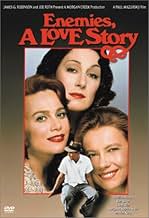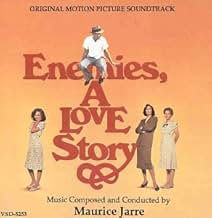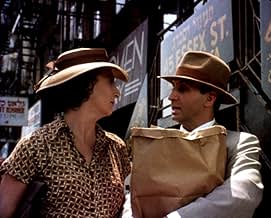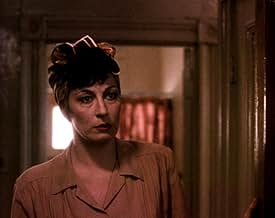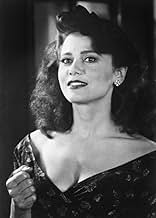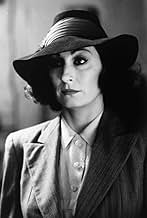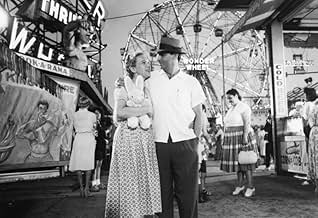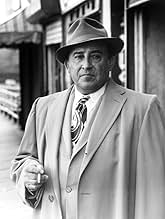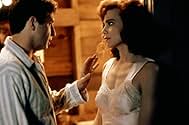NOTE IMDb
6,6/10
2,7 k
MA NOTE
Ajouter une intrigue dans votre langueA ghostwriter finds himself romantically involved with his current wife, a married woman and his long-vanished wife.A ghostwriter finds himself romantically involved with his current wife, a married woman and his long-vanished wife.A ghostwriter finds himself romantically involved with his current wife, a married woman and his long-vanished wife.
- Réalisation
- Scénario
- Casting principal
- Nommé pour 3 Oscars
- 4 victoires et 10 nominations au total
Malgorzata Zajaczkowska
- Yadwiga
- (as Margaret Sophie Stein)
Shel Goldstein
- Mrs. Regal
- (as Shelley Goldstein)
Avis à la une
Paul Mazursky's best film but then he was working with great material, in this case Issac Bashevis Singer's novel about a Holocaust survivor who, having moved to America after the war, finds himself with three living wives; he's a bigamist more by design than choice, believing his first wife died in the concentration camps, he remarried in America, (now wife number three is a whole different story).
This is a great tragi-comedy; the situation is farcial and sometimes very funny but the horror of the Holocaust permeates every frame and Mazursky treats the material with the respect it is due. This is a movie that comes close to perfection from the superb period design down to the faultless performances of the entire cast.
Ron Silver is superb as Herman, a man confident enough to try to balance three relationships at once, convincing himself he loves all the women in his life, Angleica Huston, the wife who returns from the dead, Margaret Sophie Stein as the simple servant girl he marries after the war and Lena Olin as the clinging beauty who emotionally blackmails him into marriage. Herman is a liar and a cheat and a shyster but Silver makes him hugely sympathetic, an amoral man who, nevertheless, wants to do right by everyone but who is constantly doomed to failure. This is a great movie that deserves to be better known.
This is a great tragi-comedy; the situation is farcial and sometimes very funny but the horror of the Holocaust permeates every frame and Mazursky treats the material with the respect it is due. This is a movie that comes close to perfection from the superb period design down to the faultless performances of the entire cast.
Ron Silver is superb as Herman, a man confident enough to try to balance three relationships at once, convincing himself he loves all the women in his life, Angleica Huston, the wife who returns from the dead, Margaret Sophie Stein as the simple servant girl he marries after the war and Lena Olin as the clinging beauty who emotionally blackmails him into marriage. Herman is a liar and a cheat and a shyster but Silver makes him hugely sympathetic, an amoral man who, nevertheless, wants to do right by everyone but who is constantly doomed to failure. This is a great movie that deserves to be better known.
Very little in the previous career of director Paul Mazursky gave any hint of the depth and complexity of this comedy drama, adapted from an Isaac Bashevis Singer story about the misadventures of a Jewish refugee (Ron Silver) in New York City shortly after World War Two. Silver has a few problems most men wouldn't mind sharing, including a wife who is more a devoted servant and a mistress as passionate as she is temperamental, but the cozy arrangement is complicated by the unexpected return of his first wife, long thought dead, to act as a ghostly conscience and councilor for her bewildered husband. The film is so well made, with such attention to period flavor and detail, that it seems mean to point out its few nagging shortcomings: the haphazard structure, with too many sudden, incompatible changes in mood, and the equally inconsistent characters (it's never made clear, for example, why all three women are so devoted to this particular nobody). Too bad some of the effort that went into the production didn't first go into the script, but it's still an unusually rich experience, with an added dimension of depth from the specters of the Holocaust still haunting each character.
When comedian Alan King passed away last year, I thought of his sweet performance in this should-be classic. One would not expect comedy to come from a story about Holocaust survivors, but this film takes the quirks of human behavior in the wake of tragedy and puts them on display, warts and all. I haven't read Nobel Prize winner Isaac Bashevis Singer's novel, but I can't imagine him not being pleased with Paul Mazursky's winning adaptation. Poor Ron Silver though, he finally gets a lead role, and almost every scene of his is stolen by one of his three outstanding female co-stars.
Lena Olin has the showiest part as a fiery concentration camp survivor. Full of passion, bitterness, and paranoia all at the same time, she puts sex back into an era normally depicted as colorless and empty. I don't want to say too much about Anjelica Huston's role for fear of spoiling the intrigue each revelation about her character brings. She pulls off several humorous moments as well. But the real revelation is Margaret Sophie Stein. As Silver's wife whom he married out of gratitude, she is not as naive as she seems, and her performance anchors the film.
This movie snuck in under the wire at the tail end of the 'eighties, and seemed to have gotten lost in the shuffle of high caliber end-of-the-year movies all seeking Oscar consideration. Some feel that its Best Picture nomination was stolen by Dead Poets Society. I am one of those people. But keep in mind that this was the year that Do the Right Thing was ignored in favor of more sentimental fare like Field of Dreams. Olin and Huston were nominated for their roles, but they lost to Brenda Fricker's tour de force performance as Christy Brown's mother in My Left Foot.
It bothers me that this film doesn't have more votes. Rent it, people!!! (Or better yet, buy a copy. When you see it, you'll want to.) You'll love the characters, and it's a great film to watch after you've seen something like Life is Beautiful. It is an unusual tale, but one I am glad someone thought to tell.
Lena Olin has the showiest part as a fiery concentration camp survivor. Full of passion, bitterness, and paranoia all at the same time, she puts sex back into an era normally depicted as colorless and empty. I don't want to say too much about Anjelica Huston's role for fear of spoiling the intrigue each revelation about her character brings. She pulls off several humorous moments as well. But the real revelation is Margaret Sophie Stein. As Silver's wife whom he married out of gratitude, she is not as naive as she seems, and her performance anchors the film.
This movie snuck in under the wire at the tail end of the 'eighties, and seemed to have gotten lost in the shuffle of high caliber end-of-the-year movies all seeking Oscar consideration. Some feel that its Best Picture nomination was stolen by Dead Poets Society. I am one of those people. But keep in mind that this was the year that Do the Right Thing was ignored in favor of more sentimental fare like Field of Dreams. Olin and Huston were nominated for their roles, but they lost to Brenda Fricker's tour de force performance as Christy Brown's mother in My Left Foot.
It bothers me that this film doesn't have more votes. Rent it, people!!! (Or better yet, buy a copy. When you see it, you'll want to.) You'll love the characters, and it's a great film to watch after you've seen something like Life is Beautiful. It is an unusual tale, but one I am glad someone thought to tell.
After reading the novel this film was based on, I thought: "No way! There is absolutely no way they can portray these raw emotions on film!" But that's exactly what the amazing actors do! The three women are as different as they could be, but each character is spot-on. Between these 3 women (Lena Olin, Anjelica Houston and Margaret Sophie Stein) is Ron Silver, whose character's emotions are clearly displayed on his face - I don't know if he is the anchor in the movie, because at times he is overshadowed by his female co-stars, but he makes me sympathize with him.
The "old" feel of the movie is great, and I do believe that it's a realistic image of New York in the late '40s.
It might be a bit depressing, but it should be seen if not only for the acting - trust me, it's fantastic!
The "old" feel of the movie is great, and I do believe that it's a realistic image of New York in the late '40s.
It might be a bit depressing, but it should be seen if not only for the acting - trust me, it's fantastic!
It's one of those stories that may be better in print or would have more impact on the stage, however this works suprisingly well on film. The superb acting allows it to be both effective as a drama and comedy.For those familiar with NYC in the late 40's, the setting is most believable.It's far from boring, but one must adapt to the slow pace of the movie, which in fact, proves to be an asset.All 'n all; well done. 7/10
Le saviez-vous
- AnecdotesTo recreate 1949 Manhattan within its evolved 1989 landscape production crew had to remove many television antennae and contemporary street lighting in order to create 1940s Manhattan streetscapes. Fire escapes were also covered over with mid 20th Century clothing.
- Bandes originalesSunny Side Of The Street
Composed by Jimmy McHugh
Lyrics by Dorothy Fields
Performed by Tommy Dorsey & His Orchestra
Meilleurs choix
Connectez-vous pour évaluer et suivre la liste de favoris afin de recevoir des recommandations personnalisées
- How long is Enemies, A Love Story?Alimenté par Alexa
Détails
Box-office
- Budget
- 9 500 000 $US (estimé)
- Montant brut aux États-Unis et au Canada
- 7 754 571 $US
- Week-end de sortie aux États-Unis et au Canada
- 63 636 $US
- 17 déc. 1989
- Montant brut mondial
- 7 754 571 $US
Contribuer à cette page
Suggérer une modification ou ajouter du contenu manquant

Lacune principale
By what name was Ennemies: une histoire d'amour (1989) officially released in India in English?
Répondre

